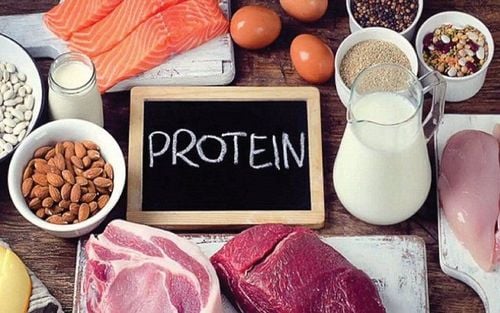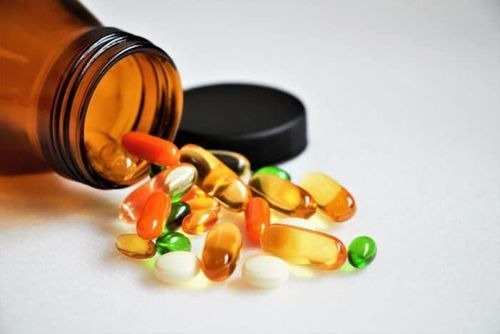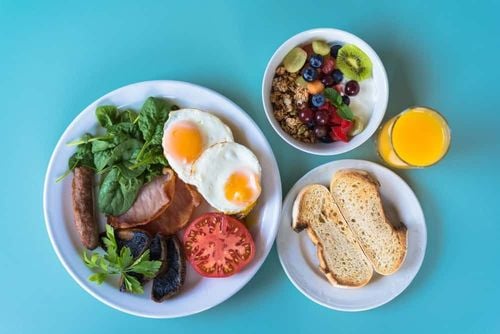This is an automatically translated article.
Breast milk is the best source of nutrition for the baby's development. However, to ensure the quality of milk to meet the baby's needs for growth and development, mothers need to be provided with adequate nutrients from food in their daily diet. Therefore, building a menu for mothers with lots of milk without fat is important for both mother and baby.
1. Breast milk contains a lot of nutrients
With the exception of vitamin D, breast milk contains most of the nutrients a baby needs for development and growth during the first 6 months of life.
The composition of breast milk is tightly controlled and the mother's diet has only a limited effect on the concentrations of some nutrients. However, a mother's diet that does not provide enough nutrients can affect the quality of breast milk and the mother's own health. In 28 ml of breast milk contains 19 -23 kcal, 3.6% protein, 28.8 - 32.4% fat and 26.8 - 31.2% carbs mainly lactose.
Unlike formula milk, the calorie content and nutritional composition of breast milk are different. Breast milk changes with each feeding and throughout breastfeeding, a mother needs to meet her baby's nutritional needs.
When feeding begins, the colostrum will be more watery and often have a thirst-quenching effect. Later milk will be higher in fat and contain more nutrients. In fact, hindmilk contains 2-3 times more fat than foremilk and the calories in 30ml of milk are 7-11 calories higher. Therefore, in order to get the most nutritious milk, it is important to let your baby finish the milk from one breast before moving on to the other breast.
2. Breastfeeding requires more calories
The hard work of the mother's body is to produce milk. Breastfeeding increases the mother's energy needs by about 500 calories/day. In addition, mothers also have increased requirements for other nutrients. Therefore, it is very important to eat a healthy and varied diet.
If a mother wants to lose weight quickly after giving birth, she needs to be patient. If the mother does not lose weight or gain weight during the first 3 months of breastfeeding, it is normal. Due to hormonal changes in the body, the mother may have more cravings than usual and be more prone to fat retention. If a mother restricts her intake too much, especially during the first few months of breastfeeding, it can reduce both milk supply and milk quality.
However, breastfeeding mothers will likely burn fat naturally after 3 to 6 months of breastfeeding and begin to lose more weight than non-breastfeeding mothers.
When mothers lose about 0.5 kg per week through a combination of diet and exercise, there will be little effect on milk supply as well as the nutritional composition of milk. However, thin women may be more sensitive to calorie restriction. Therefore, it is necessary to eat more to avoid reducing milk supply as well as affecting milk quality.
Mothers should remember that losing weight after giving birth is a marathon, not a sprint. While it takes time to gain weight during pregnancy, it also takes time to lose weight after giving birth.

Giảm cân sau sinh cần có thời gian
3. Nutritional needs of nursing mothers
Energy: The mother's energy during this period is needed and should be equivalent to the energy for the mother to excrete milk. The average amount of milk a day is about 750 -850 ml, equivalent to 67 kcal / 100 ml, calculated about 502 - 570 kcal / day. The efficiency of milk synthesis in the mother's body is 90%. That means, energy needs need to add 550 - 625 kcal / day compared to the needs of adults. Protein: Protein requirements in the first 6 months are increased by 20-25 grams/day compared to adults. The next six months will increase by 17 grams/day. Lipids: For women in general and postpartum mothers in particular, the total lipid/energy requirement (%) is 20 - 25%, and the maximum is 30%. Vitamins: vitamin B2 (increase by 0.5mg/day), vitamin C (95mg/day), folate (increase by 100 mcg/day), vitamin A (850mg/day) Minerals: Iron (24mg/day), calcium ( 1,300mg/day), zinc (in the first 6 months postpartum about 9.5mg/day and after 6 months about 7.2mg/day)
4. Using nutrient-dense foods for nursing mothers
Maternal nutritional needs will usually be greater during lactation and the mother must provide enough food ingredients in the diet to meet the needs of both mother and baby. The amount of nutrients in the diet can directly affect the presence of these nutrients in breast milk. On the other hand, some nutrients are also passed into breast milk regardless of the source of that nutrient being consumed by the mother. It's important to eat a variety of nutritious, whole foods to make sure you're getting all the nutrients you and your baby need. So, what should a mother eat while breastfeeding to ensure that she meets the recommended needs? Here are some nutritious foods for mothers as well as quality milk for babies:
Fish and seafood: salmon, seaweed, shellfish, sardines Meat: beef, lamb, pork , organ meats such as liver. Fruits and vegetables: berries, tomatoes, cabbage, kale, garlic, broccoli Nuts: almonds, walnuts, chia seeds, hemp seeds, and flaxseeds. Other foods: eggs, oats, potatoes, quinoa, buckwheat, dark chocolate. In addition, mothers should avoid processed foods as much as possible because they are often high in calories, added sugars and unhealthy fats.
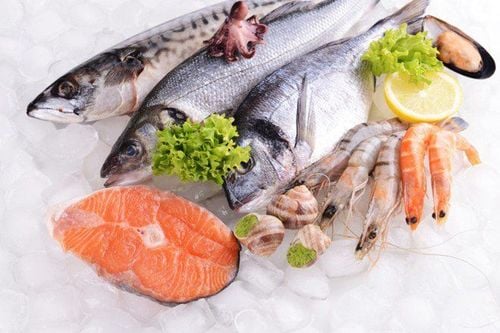
Bà mẹ nuôi con bú nên bổ sung thêm cá và hải sản
5. Some nutrients determine the quality of breast milk
Nutrients in breast milk can be classified into two groups, depending on how well they are secreted into the milk. The amount of group 1 nutrients in breast milk depends on the diet, while group 2 nutrients are secreted into breast milk regardless of the amount of nutrients ingested by the mother or the mother's health status. Therefore, getting enough group 1 nutrients is very important for both mother and baby, while getting enough group 2 nutrients is largely dependent on the mother. Mothers always ask the question "what to eat a lot of milk?". Here are some group 1 nutrients and common food sources:
Vitamin B1 (Thiamin): fish, pork, almonds and bread Vitamin B2 (Riboflavin): cheese, almonds, assorted nuts, red meat, oily fish and eggs Vitamin B6 : nuts, almonds, fish, poultry, pork, bananas and dried fruit Vitamin B12 : Shellfish, liver, oily fish, crabs and shrimp Choline : eggs, beef liver, chicken liver, fish and peanuts Vitamin A : sweet potatoes, carrots, dark green leafy vegetables, organ meats, eggs Vitamin D: cod liver oil, oily fish, some mushrooms and fortified foods. Selenium: Brazil nuts (cashew), seafood, fish, wheat Iodine: dried seaweed, cod, milk and iodized salt The amount of group 1 nutrients is significantly reduced in breast milk if the mother is deficient in these nutrients. this ingredient or not getting enough from the diet. For this reason, the mother needs to provide enough group 1 nutrients in her diet to ensure the quality of milk meets the needs of the baby.
Some group 2 nutrients and common food sources:
Folate: Beans, lentils, green vegetables, asparagus, avocados Calcium: milk, yogurt, cheese, green vegetables and legumes Iron: red meat , pork, poultry, seafood, beans, green vegetables and dried fruit Copper: shellfish, whole grains, nuts, beans, organ meats and potatoes Zinc : oysters, red meat, poultry, beans, nuts and milk The amount of group 2 nutrients in breast milk is not affected by the mother's diet. If the intake of these substances is low, it is possible that the mother will take up the stored nutrients of the mother to excrete into the milk. As a result, your baby still gets enough of these nutrients. However, the mother's nutritional reserves can also be depleted if the diet does not meet the recommended needs. To avoid this situation, mothers still need to be provided with adequate nutrients from food in their daily diet.
Các loại vitamin cần được bổ sung cho bà mẹ nuôi con bú
6. Extra Supplements for Nursing Mothers
Mothers are always skeptical of using supplements especially while breastfeeding. Many supplements contain herbs, stimulants, and active ingredients that can be passed into breast milk. However, there is also another supplement that may be beneficial for nursing mothers. These include:
Multivitamins: Some women may be deficient in important nutrients due to frequent morning sickness (vomiting, fear of food...) and not providing enough nutrients. nutrition for the diet. Mothers will benefit from taking a multivitamin while breastfeeding. Omega-3 (DHA): DHA is an essential long-chain omega-3 fatty acid in nutritional requirements. It is found in many seafood and algae. It is an important component of the central nervous system, skin and eyes. DHA is also important for brain development and function. If the mother consumes low amounts of DHA, it will also be low in breast milk. Omega-3 deficiency in early life is associated with a number of behavioral problems, such as inattentiveness, aggression, etc. Therefore, pregnant and lactating women should take it. at least 2.6 grams of omega-3s and 100 to 300 mg of DHA per day.
Vitamin D: Vitamin D is mainly found in fatty fish, cod liver oil and dietary supplements. It is important for bone health and immune system function. Vitamin D is usually only present in very low amounts in breast milk. Therefore, babies from 2-4 weeks old are recommended to supplement with vitamin D. A lack of vitamin D can have serious consequences such as muscle weakness, bone loss and an increased risk of fractures. Children with vitamin D deficiency can have convulsions, rickets and a number of other diseases that affect the child's development.
7. Daily water requirements for nursing mothers
As a rule, the mother will drink water when thirsty and drink until the thirst is gone. However, for mothers who are breastfeeding, the process of lactation will make the mother dehydrated. Therefore, drinking enough water will help the mother meet the increased requirements for milk production. It is best for mothers to drink plain water, or maybe juice or milk.
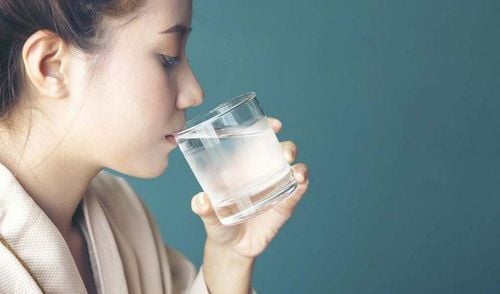
Uống đủ nước giúp đáp ứng yêu cầu gia tăng về sản xuất sữa
8. Some foods mothers should not eat while breastfeeding
Caffeine: About 1% of the caffeine consumed by a mother is transferred to breast milk. It takes a baby a long time to metabolize it. Besides, it is also a factor that affects the baby's sleep. Alcohol: Alcohol can also pass into milk and it takes a long time for your baby to metabolize it. Cow's milk: About 2-6% of babies may be allergic to cow's milk from their mother's diet. Signs of an allergy are rash, eczema, diarrhea, bloody stools, vomiting, abdominal pain ... If this happens, it means that the baby is not able to tolerate the protein of cow's milk. She should not use cow's milk in her diet. Breast milk is a valuable source of nutrients that are good for a baby's development. Therefore, maintaining a nutritious diet to ensure milk production is essential. However, mothers should also breastfeed regularly and scientifically as well as maintain a reasonable diet so as not to gain weight too quickly, thereby giving rise to many dangerous diseases.
Vinmec International General Hospital is not only famous for its professional quality of medical examination and treatment, but also stands out for its many medical services as well as a system of modern facilities and standard equipment. In particular, at Vinmec, there is a team of qualified and experienced doctors and nurses who wholeheartedly care, treat, restore and advise on postpartum nutrition, as well as guide pregnant women on how to have a healthy pregnancy. the best amount of milk, ensuring the baby's development as well as the mother's health recovery quickly.
Customers can directly go to Vinmec Health system nationwide to visit or contact the hotline here for support.
Reference source: healthline.com





